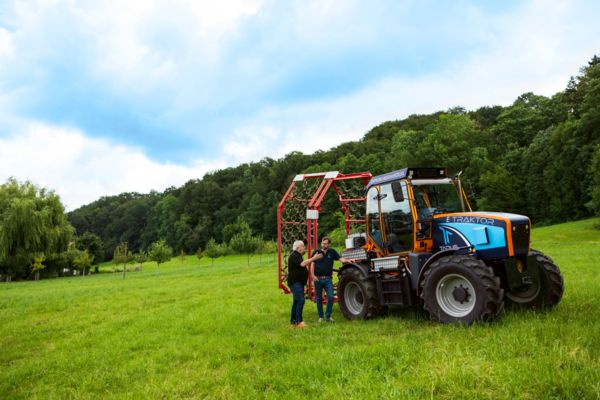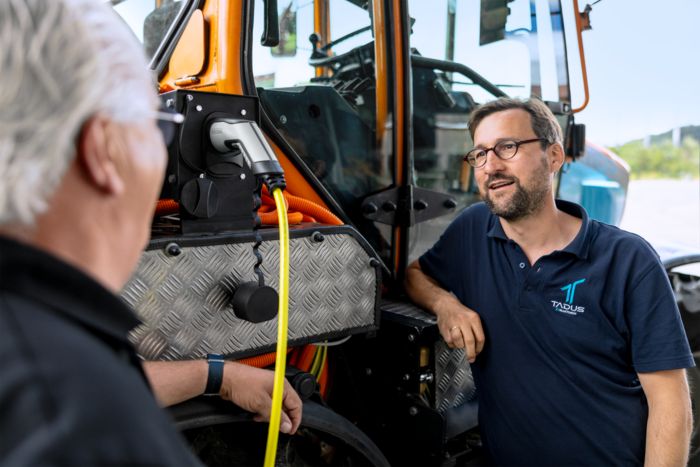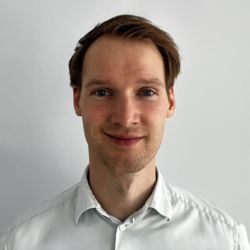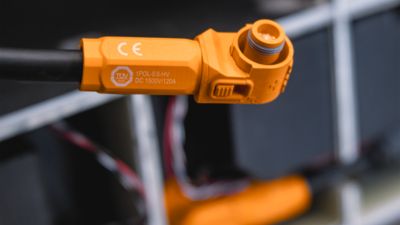Sowing the future The Alztaler Hofmolkerei dairy farm in southern Germany shows what a shared passion for technological innovation has to do with the future of agriculture.

Brief summary
Driven by electricity over the fields: The Tadus tractor is a practical example of the path to a carbon-neutral future. It also represents the personal journey of people like Dr. Thaddäus Baier, founder of Tadus GmbH, and Frank Bulmahn, Solution Engineer at Phoenix Contact Deutschland GmbH, who firmly believe that carbon-neutral agriculture is already possible today.

For Dr. Thaddäus Baier the future of agriculture is electric
Fossil fuels are not necessary at all
One has a degree in aerospace engineering and is working with a dedicated team to develop an electric tractor ready for series production. The other is a trained toolmaker and sales expert with 14 years of experience specializing in customer-specific solutions in the field of e-mobility at Phoenix Contact.
In modern agriculture, fossil fuels are still widely used to power machinery, irrigation systems, and buildings. Is this necessary? “No,” says Dr. Thaddäus Baier firmly. The developer of the Tadus tractor believes that many farms already have the necessary infrastructure to operate in an environmentally-friendly and energy-efficient way. Current figures from the Federal Statistical Office of Germany show that in 2023, 26% of German farmers generated renewable energy. 94% use photovoltaic systems to do this. There are 61,200 photovoltaic systems installed on German farms.

After the test drive, Frank Bulmahn also tests the charging of the Tadus
The electric tractor closing the gap to sustainable agriculture
With a photovoltaic system on the roof and a home charger on the wall, the Tadus tractor could prove to be a crucial piece of the puzzle in closing the gap to sustainable agriculture. It uses, stores, and provides sustainably generated energy and can thus make the All Electric Society a reality on farms. It is therefore also a perfect example of sector coupling, whereby energy generated from renewable sources is used as required.
The electrically powered tractor is currently being trialed as a test vehicle at the Alztaler Hofmolkerei dairy farm. With 100 kW of power, it is perfect for haymaking and leaves Frank Bulmahn, sales expert at Phoenix Contact Deutschland GmbH, beaming after a ride across the pasture: “Wow, it really goes!”
This test drive is not Frank Bulmahn’s first visit to Dr. Thaddäus Baier and the Tadus. The two share an enthusiasm for technical innovations and visionary ideas. “We had a small problem with the charging inlet when starting up the Tadus. All it took was a quick call to Phoenix Contact and Frank Bulmahn was on the job, full of enthusiasm about our project,” Baier explains. He was impressed by the dedicated and direct support. “That’s not something you expect from a company of that size.”

Hay drying is operated by the photovoltaic system and the Tadus, when it is not being used out in the field.
“We need people with vision”
“This is where agriculture is being rethought,” explains Frank Bulmahn regarding his involvement in the Tadus project. “These are precisely the people and ideas that we need in order to drive the All Electric Society forward.” For the sales expert, direct contact with developers like Thaddäus Baier is a real highlight of his work. “Bringing the right products and the right people together at the right time and actively supporting them – that is my passion.”
The CCS type 2 charging inlet from Phoenix Contact is the right product for the Tadus tractor. It can be loaded with 250 A continuous current and with 500 A on a temporary basis. Featuring IP6K9K (front area) and IP67 degree of protection, it is particularly suitable for the harsh conditions in agriculture.
Frank Bulmahn was able to see this for himself when he visited the Alztaler Hofmolkerei dairy farm. The family-run organic farm is located 30 km from Lake Chiemsee. 60 grass-fed cows supply the organic milk for various products such as butter, yoghurt, and cheese, which are produced directly on the farm.
In winter, the hay feed comes from the farm’s own hay drying facility, which is also one of the biggest energy consumers on the farm. For optimum drying, the 30 kW fan and the 25 kW dehumidifier run around the clock. The farm’s own photovoltaic system basically provides the power supply. But when the Tadus tractor is not needed out in the field, it also demonstrates its prowess here. In addition to mobile use, it can also be integrated into building management as an energy storage system. Thanks to the interchangeable battery system, it is always ready for operation.

In the future, going to the charging inlet could be just as natural in agriculture as going to the milking machine
Potential savings of up to 80%
“When you consider that a tractor is only driven for 500 to 1,000 hours of the 8,000 hours that make up a year, this opens up a whole new world of possibilities,” says Thaddäus Baier. The potential is huge. The German Federal Motor Transport Authority puts the number of tractors in use in German agriculture at more than 300,000, with around 30,000 new tractors being added each year. And the pressure on farmers to work more cost-effectively is growing, and not only due to the looming withdrawal of diesel subsidies. “With conditions like those at this dairy farm, the operating costs of the tractor can be reduced by up to 80% just by using the photovoltaic system. And that’s not even taking into consideration the added value of integrating it into building management.”
The Tadus team is currently working at full speed to bring the tractor to series production. A prototype with 200 kWh battery capacity is expected to be rolling across the fields by the middle of 2025, with market launch set for the end of 2025. On his visit to southern Germany, Frank Bulmahn brought along the appropriate charging inlet, because he himself knows that: “On the journey to a sustainable future, actions speak louder than words.”
Summary
The collaboration between Dr. Thaddäus Baier and Frank Bulmahn impressively illustrates how technical innovations can pave the way to carbon-neutral agriculture. The Tadus tractor, a symbol of sustainable agriculture, demonstrates the potential of renewable energy and modern technology. The trial operation at the Alztaler Hofmolkerei dairy farm serves as an example of how farms can significantly reduce their operating costs by using photovoltaic systems and electric tractors while at the same time making an important contribution to climate protection. The vision and commitment of people like Baier and Bulmahn are crucial to making agriculture sustainable and efficient in the future and to realizing the idea of the All Electric Society.
Connect with our experts





